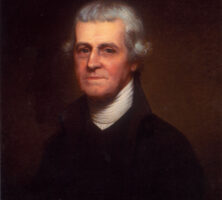Called the “Morning Star of Liberty,” Noble W. Jones was prominent among Georgia’s Whig leaders before and during the American Revolution (1775-83) serving in both the provincial and state legislatures and in the Continental Congress. During the early national period he turned away from politics and made a laudable record as a progressive physician and Savannah civic leader.
Born in England in the early 1720s, Noble Wimberly Jones came to Savannah in 1733 with his parents, Sarah Hack Jones and Noble Jones, and his sister, Mary, all members of the first group of Georgia colonists. He was trained for a medical career by his father, who also set him an example of government service, though the younger Jones would become as ardent a Whig as the elder proved a confirmed Tory. Like his father, Noble W. Jones accumulated thousands of acres of land, including his estate at Wormsloe, in the young colony. His planting interests, particularly in rice lands along the Ogeechee River, contributed considerably to his income.

Courtesy of Telfair Museums.
In 1755 Jones wed Sarah Davis. They had fourteen children, and survived all but one. Their son George, however, would provide them with numerous lineal descendants, among them the branch of the family that took the name De Renne.
The year he married, Jones began his political career with election to the Commons House of Assembly, the lower house of Georgia’s provincial legislature, where he would serve until 1775. His most conspicuous service began in the mid-1760s, as controversies erupted over such British taxation measures as the Stamp Act and Sir James Wright, the royal governor, frequently dissolved the lower house. In 1768 Jones was first elected Speaker of the Commons House and was instrumental in the appointment of Benjamin Franklin to act as Georgia’s colonial agent in London to convey Georgia’s protests to Parliament. Governor Wright viewed Jones as a serious threat to royal authority and thereafter dissolved the Commons House whenever it elected Jones Speaker. Consequently, the defiant Commons House elected Jones repeatedly between 1771 and 1773.
The Intolerable Acts (1774) having increased resistance to the crown, Jones and other Whigs met in early 1775 to form Georgia’s short-lived Provincial Congress. It named Jones and two others as delegates to the Second Continental Congress, but citing insufficient public support, they did not attend. In May 1775 news of the outbreak of fighting in Massachusetts electrified Georgia’s Whigs, and Jones and several other revolutionaries (including Joseph Habersham, John Milledge, and Edward Telfair) broke into Savannah’s royal magazine. They seized 600 pounds of gunpowder, some of which apparently made its way to the rebels in Boston. The next Provincial Congress met in July 1775 and again elected Jones a delegate to the Continental Congress, but his father’s terminal illness kept him in Savannah, where by year’s end he was serving on the Revolutionary Council of Safety.
With the royal government’s collapse in early 1776, Jones and the Whigs took control of Georgia. He was a member of the convention that created the state’s Constitution of 1777, and when the Provincial Congress became the House of Assembly, Jones again was elected Speaker. As the British captured Savannah in 1778, Jones escaped to Charleston, South Carolina, where he worked as a physician until he was captured along with the city in 1780. After imprisonment in St. Augustine, Florida, Jones was transferred through a 1781 prisoner exchange to Philadelphia, Pennsylvania. There he served as a Georgia delegate to the Continental Congress while practicing medicine as a protege of Dr. Benjamin Rush. Back in Savannah by 1783, he was soon once more elected the Speaker of the House of Assembly, but the session proved quite disorderly. Having suffered a sword wound while attempting to quell a mob, Jones resigned his office and moved again to Charleston, where he worked as a doctor for five years.
Returning to Savannah for good in 1788, Jones was on hand to help supervise the elaborate festivities welcoming President George Washington to Savannah in 1791. In 1795 he presided over the convention that met in Louisville to amend the Georgia Constitution of 1789. This was Jones’s last major political act, but he continued his medical practice. In 1804 he helped organize the Georgia Medical Society and became its first president. Though increasingly ill in the early 1800s, Jones practiced medicine until his death. He entered his final illness, in his early eighties, after five consecutive nights of exhausting obstetric cases. In Savannah his death elicited general mourning as well as numerous eulogies, appropriate to both the last survivor of Georgia’s original colonists and a principal leader in the colony’s struggle for independence.






